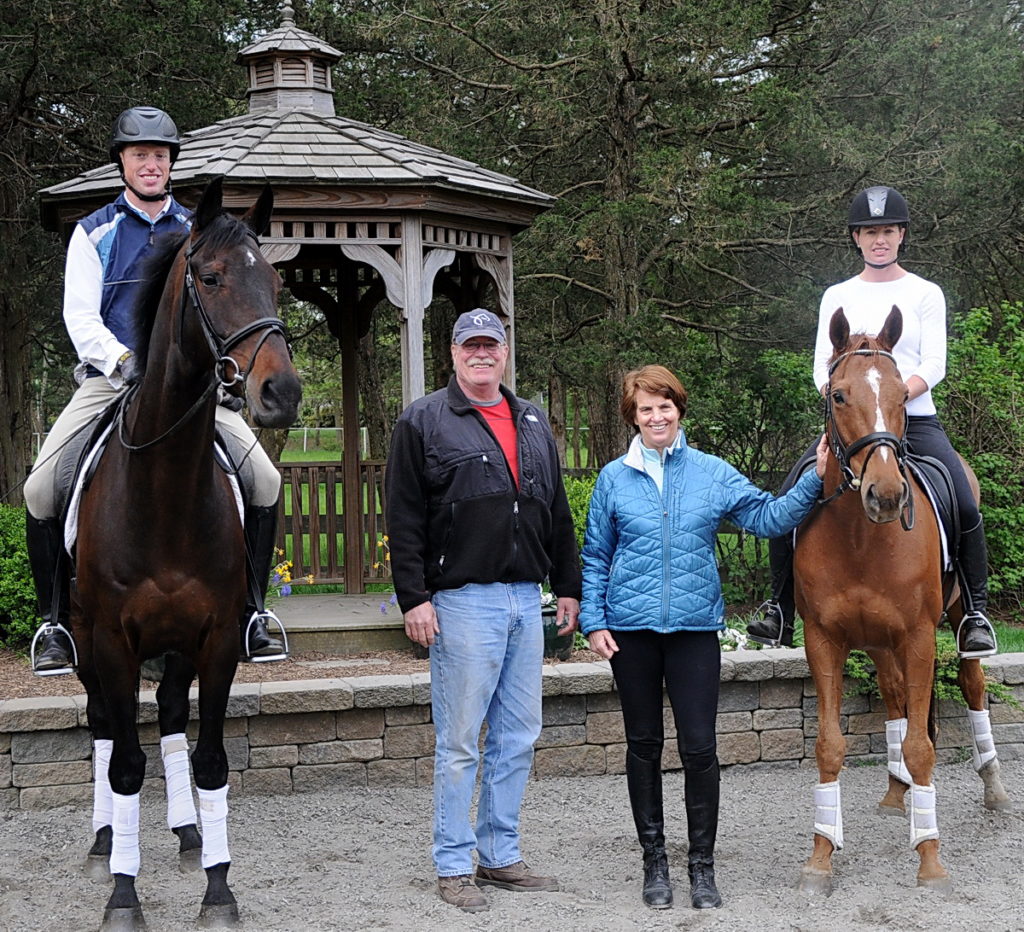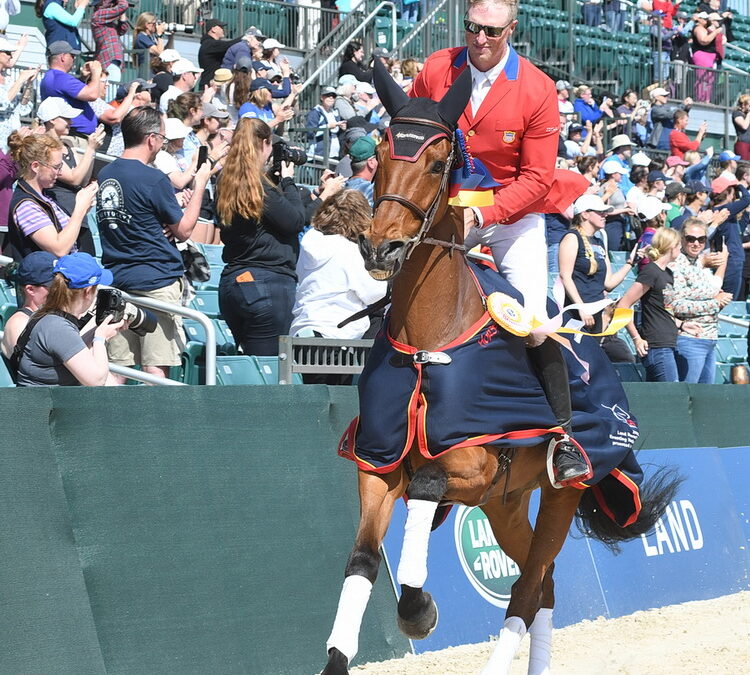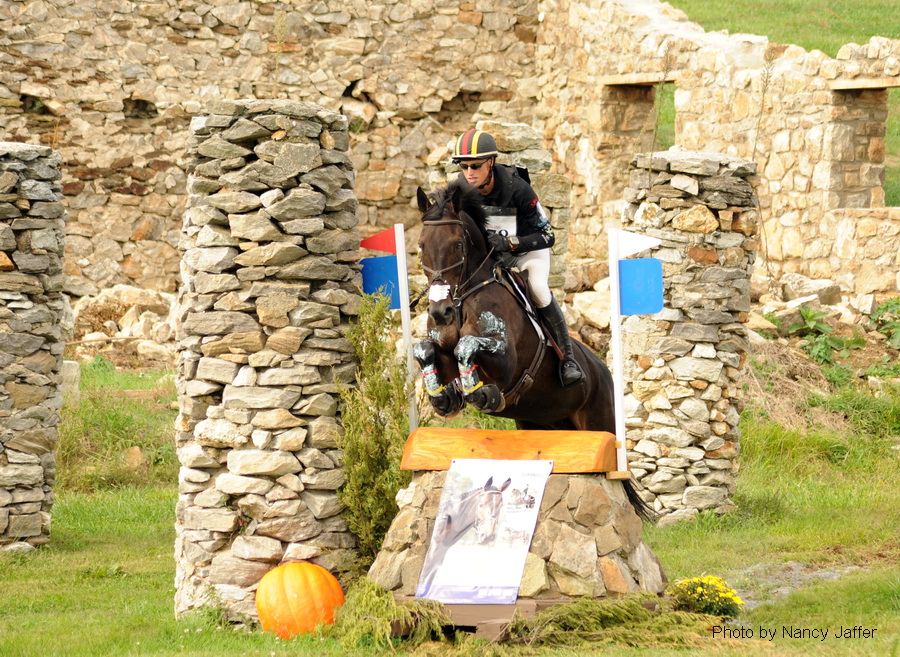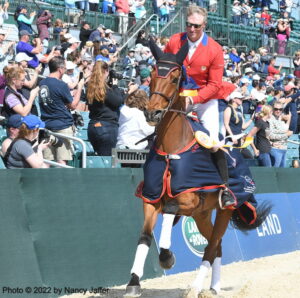A team gold medal and individual fourth place in eventing at the Pan American Games, along with the best U.S. finish in the discipline at the 2021 Tokyo Olympics, all have made Doug Payne crave more international team experience.
But he’s going in a different direction as he turns 44 this month, having moved out of eventing to focus on grand prix show jumping.
“It’s been a process the last seven years,” he explained, talking about competing in two disciplines simultaneously. Last year at the Defender Kentucky 5-star, for instance, he rode his eventing horse in the afternoon and other mounts in the jumpers at night.
Quantum Leap, his entry for that 2024 5-star, was fifteenth after cross-country, but withdrawn in the second vet check. He has what Doug called a hock that could be tricky after cross-country. Third in the 2022 Kentucky 5-star, where Doug was the highest-placed U.S. rider, Quantum “doesn’t owe me a thing,” he said.
“With his welfare in mind, I figured it was probably best to step him back from 5 star eventing.”
He may lease the horse for a few years. But if his children, now ages five and seven, “want to ride at some point, he’d be the absolutely perfect one. But he’s got a home for life, he’s the most genuine creature there is.”
And as that special horse steps down, Doug is stepping up in his other discipline.
“The jumping, I love it, jumping big fences is as much, if not more, fun than anything else I’ve done. It’s a brand new challenge, completely fresh. I would like to make a (show jumping) team in the future. Without a doubt, it’s a goal of mine.”
In order to pursue it, he has wrapped up his eventing career and put his focus on the painted rails, though he did compete in a dressage Grand Prix with his Pan Am Games mount, Starr Witness.
“I don’t know if there will be a whole lot more of that, but for sure, it’s great experience,” he said.
The eclectic horseman, who also pilots his own plane, pointed out that when he was growing up, the idea was to “make sure you can to go to any discipline and not be tagged as an outsider.”
He comes from an eventing family. His mother, Marilyn Payne, is a trainer and competitor who has been an Olympic judge. His sister, Holly Payne Caravella, also is an eventing trainer and rider.

Doug grew up eventing at his home in New Jersey, where he is seen here a few years back with his father, Richard; mother, Marilyn, and sister, Holly Payne Caravella.
Doug, who competed in his first show jumping grand prix in 2022, noted his “headliner right now is a horse called Quintessence. He did three 5-stars jumping last year.”
The 14-year-old Holsteiner, who finished sixth in a 1.5 meter classic at the Winter Equestrian Festival in Wellington last month, evented up to Preliminary as a six-year-old before switching to jumping full time.
“He’s uber careful, he won the 6- and 7-year old finals and a $100,000 grand prix. It was more than I could have ever imagined he would do,” Doug recounted.
Doug pointed out that he and his wife, Jessica, have “never been in a position where we could go out and buy going horses, so we relied a lot on development of younger horses. Six or seven years ago, we started buying more for jumping than eventing, a long-term plan of this happening. It worked pretty well in eventing, and we’ll see if we can’t make it happen here as well.”
He has a six-year-old half-brother to Quintessence, and Europa PVF, a 5-year-old Westfalen by Eldorado, is “probably the best horse I’ve ever had. Then there’s “ a great weanling” coming along. At the same time, Starr Witness is pregnant with Europa’s foal.
“They’re both extreme talents,” Doug pointed out, so his show jumping future seems to offer plenty of potential for him to develop.
At the same time, he emphasizes, “I don’t regret a moment of eventing.”
There were several tragedies in eventing in 2024, including British rider Georgie Campbell’s death after a cross-country accident and Liz Halliday traumatic brain injury in a cross-country fall.
While he’s not leaving the sport because of the danger, Doug acknowledged, “It’s an inherent risk. It can happen anywhere, but certainly your odds are up when the jumps don’t fall down, or slowly fall down. Looking back on it, I was pretty impressed I never got an ambulance ride from an event. It’s something I was pretty proud of, actually.”
He noted, “I’ve been on the USEA (U.S. Eventing Association) Safety Committee for eight years and had a front row seat to every accident analysis in this country. It’s certainly a concern. I’ve always really worked extremely hard to make sure whatever I’m riding I completely trust,”
Still, he pointed out, “You can get hurt doing anything. I know all the organizations are doing as much as they can to reduce the risk.”
Going all-in on the jumping has given Doug a chance to use his time differently.

For Doug Payne, show jumping now is much more than what he used to do as the last phase of an event. (Photo © by Lawrence J. Nagy)
“With the kids, it has freed up our schedule. We’re on the road 40 plus weeks a year. The kids just turned 5 and 7 it will free up time and allow us to do a whole lot more.
“The eventing schedule is so rigid,” he pointed out. With jumping and the plethora of shows from which to choose, “there’s so many more options we never had a chance to explore before. Now we can.”
He likes what he’s found in the show jumping ranks.
Payne Equestrian Sport Service & Sales has “An army of very competent people willing to help,” and cited South Carolina trainer Andrea King (like Doug, a native of New Jersey) for giving pointers while he pursues his new objective.
“I grew up from Pony Club eventing; the perception was always `stuck up show people.’ Our experience has been the opposite. It’s been open, accepting,” Doug related.
He pointed out, “Eventing is very difficult because of few opportunities to prove yourself. If it goes wrong, that’s all somebody talks about for the next however long.”
By contrast, in show jumping, ““You could win another grand prix tomorrow. People are more willing to take a shot and make a mistake. There are so many opportunities to compete and to vie for a top result somewhere.”






